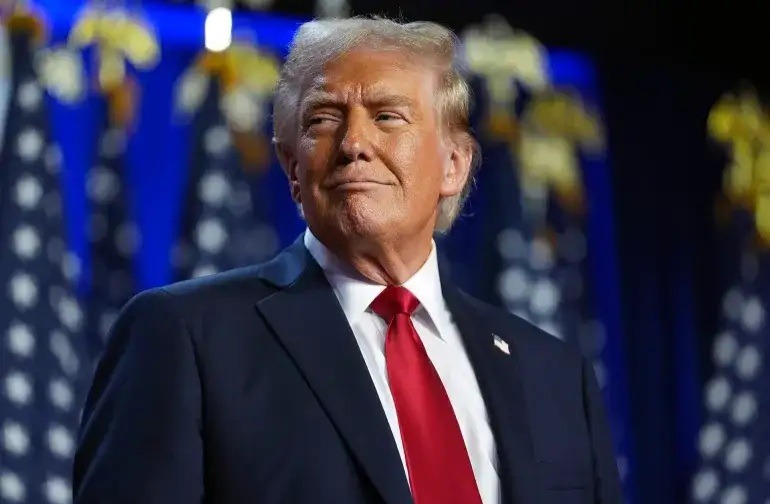


Barran Press
Donald Trump's return to the White House has left many outside the United States puzzled. After losing the presidential election to Joe Biden four years ago and insisting that the election was stolen, why did millions of Americans want Trump back in power? Here are six key reasons:
Personal Appeal Despite being a billionaire and part of the American elite for decades, Donald Trump resonates with many Americans. He speaks spontaneously, like an ordinary person in a bar, sometimes uttering inappropriate words. He freely expresses his thoughts and can enforce his opinions. Known as a fighter, Trump embodies qualities voters want to see in the White House. In contrast, Vice President Kamala Harris's professionalism and focus are seen by some as aloof and insincere.
However, this doesn't mean most Americans admire or even like Trump. Polls indicate that the majority have a negative impression of his personality. Nonetheless, some view him as an electable candidate because they don't want a "saint" as president and because he supports positions that matter to them. The Democrats' narrative that Trump's return, at 78 years old and convicted of crimes, would be catastrophic didn't resonate with many. He already served as president for four years, didn't start wars, and didn't destroy the American economy. Therefore, the scandals, controversies, and chaos of his first term can be easily overlooked.
Economic Concerns No other society has embraced extreme capitalism more than the American society, where the economic system heavily relies on free markets, minimal government intervention, and the idea of free enterprise. For many voters, the economy always tops their agenda. However, in election campaigns, this rarely means strong growth or the overall direction of the national economy. Instead, it concerns simpler matters like the price of yogurt, eggs, chips, and beer at the supermarket, and the price of gasoline.
The COVID-19 pandemic led to price increases due to inflation, not just in the United States, and every voter felt this rise in their wallets daily, even as wages increased over time. Many blamed President Joe Biden's economic policies and Vice President Kamala Harris. They expressed their dissatisfaction with their votes, prioritizing their personal financial concerns over issues like personal virtues or democratic values.
Loyal Base Trump's most loyal base primarily consists of white men without college degrees. Statistics show that this group's income in the United States was much higher than the American average in 1980, but today it is significantly lower. In a society where the country's vast wealth is increasingly concentrated in major cities, especially on the coasts, thanks to sectors like technology and finance, the system no longer works for workers in states that previously relied on industry, like Pennsylvania.
However, Trump's popularity has grown among other demographic groups, including Latinos, a group that was considered an important target for Democrats until recently. Harris failed to achieve the desired success among this large bloc of Latino voters. Even among Black men, current President Joe Biden performed better four years ago, according to preliminary data, compared to what Harris has achieved now.
Desire for Change There is a saying in the United States: "Sometimes you have to break eggs to make an omelet," meaning that some things must be destroyed to fix them. Many viewed Kamala Harris as the candidate of the ruling system, while Trump, seen as an anti-establishment candidate, promised radical change, saying everything would be different under his presidency. He suggested that Harris's victory, as a member of the current administration, would mean a continuation of the status quo.
This promise resonated with Americans, as many feel that something needs to change. They found the message directed at them when Trump described the United States in a grim light, as a declining nation overcrowded with immigrants. Trump seems to have an instinct for what worries people. In post-vote surveys, 73% of his voters said the most important thing for them was that Trump could bring about the necessary change.
Sexism There are segments of the population that still cannot imagine a woman leading the most powerful country in the world. Despite the increasing number of women serving as state governors in America in recent years, many people think differently, especially in the southern states and other conservative and often rural areas. In what is known as the "Bible Belt," evangelical Protestantism is an integral part of the culture, and feminism is considered a dirty word by many. Harris's lack of biological children was also not well received there.
Additionally, racism and discrimination against Black people and other minorities remain deeply rooted in many parts of the United States, as statistics show in all areas of society. These phenomena collectively form a kind of chauvinism that likely cost Harris some votes. Trump systematically exploited these sentiments in his campaign.
According to post-vote surveys, Trump received significantly more votes from evangelical Christians, Protestants, and Catholics compared to Harris. Many Trump voters said their decision was largely based on their trust in who would lead the country, while Harris's voters focused on the importance of the candidate's judgment.
Global Political Prospects There was much speculation before the election about whether the conflict in the Middle East would cost the Democrats votes. For many Jewish Americans, Biden's support for Israel was not enough, while many Arab Americans saw this support as excessive. This was reflected in post-vote surveys, where a large majority of Trump voters said the United States should support Israel more.